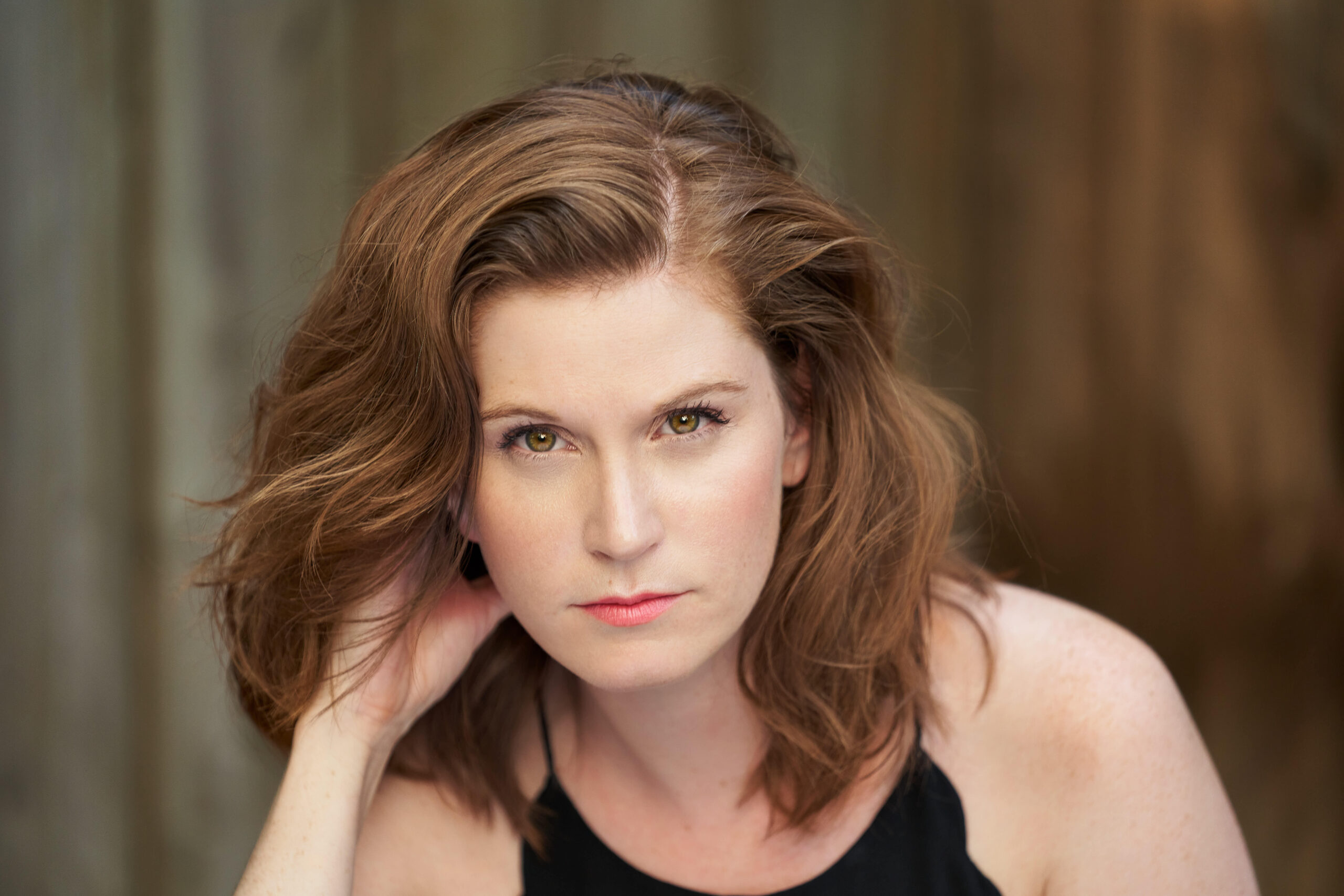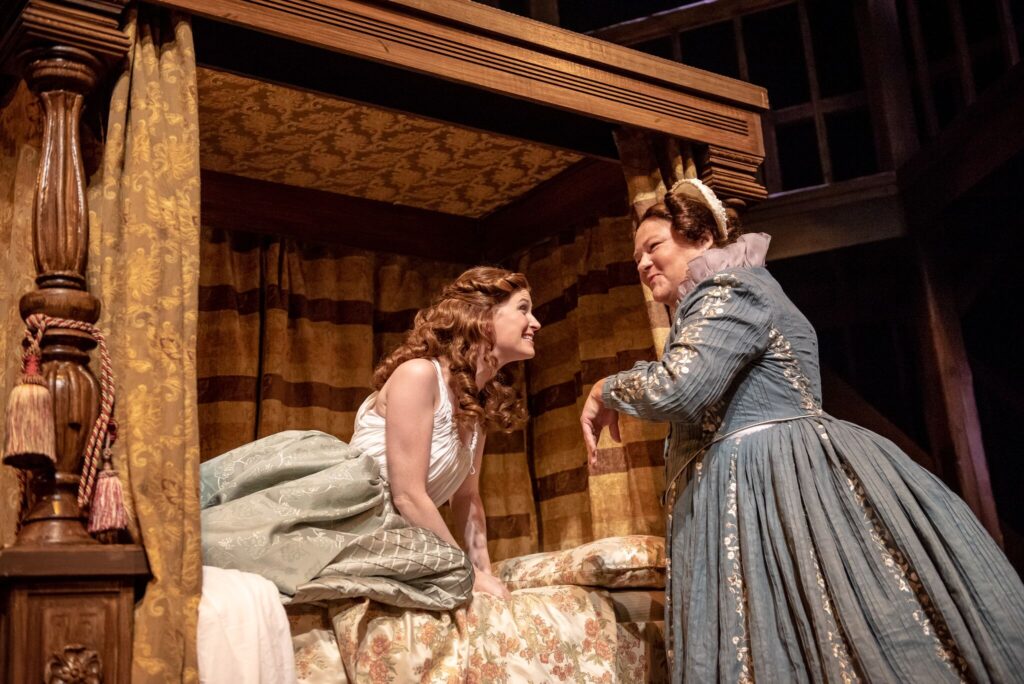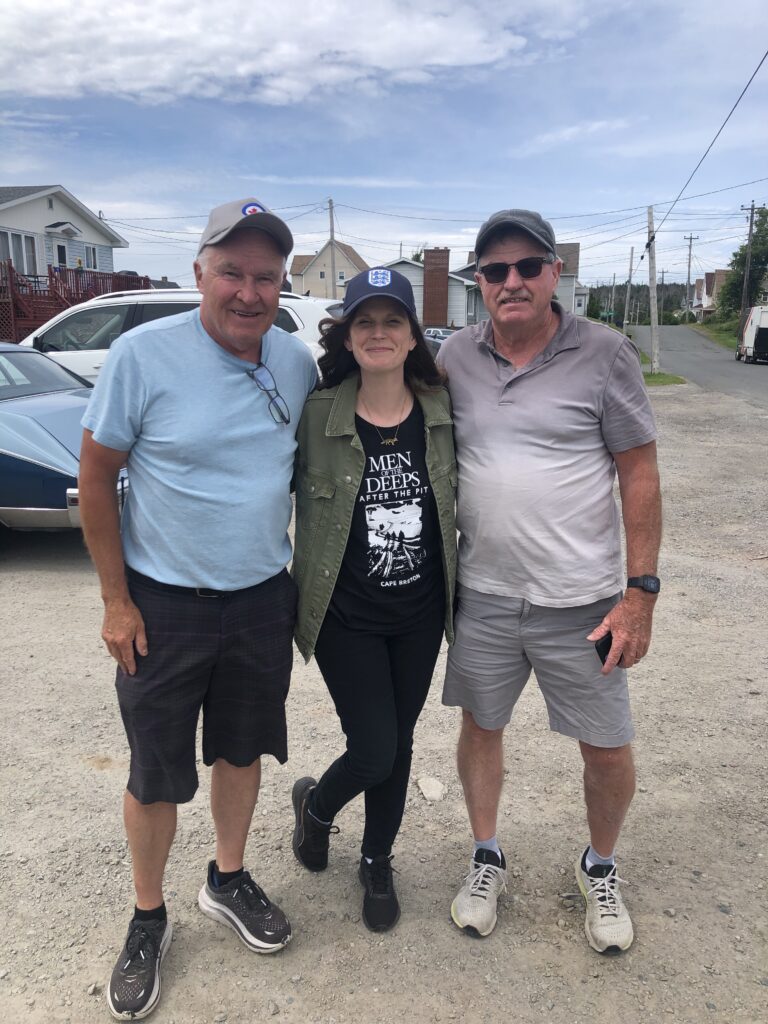
Sarah English. Photo: Grant Landry.
When Sarah English was approaching thirty, a time when she might no longer be playing the ingenue, but was not yet old enough to be cast as the mom, she was encouraged by her friend to figure out what her other passion was. English realized that she had always connected to the voice work aspect of her job. “Accents and voices have always been part of my process,” she says during our zoom call from her home in England, “It has always been part of my getting into the work, and also the daily practice while doing the work. I’m usually one of the only people doing a full voice warmup before the show.”
She was at Neptune Theatre here in Halifax, playing Viola in Shakespeare in Love and sharing a dressing room with Susan Stackhouse, who is herself a voice, speech, and dialect coach, and a Professor Emerita at the Fountain School of Performing Arts. When English mentioned her interest in becoming a dialect coach to Stackhouse, she recommended her own alma mater: The Royal Central School of Speech and Drama at the University of London. It was a coming together of a lot of disparate parts of English’s interests in the performing arts. She had been teaching theatre for twenty years, beginning as a teenager at Neptune Theatre School, where she herself had started out taking classes as a child. “Growing up I loved film,” she said of the final piece, “I discovered in my twenties that I actually don’t love acting in film. It’s a different style of acting. I love what I can do in theatre.” But what she discovered more recently is that she wanted to make films. “I don’t necessarily need to be on screen. I want to be part of the making process. Once that came into my brain I was like, so here are the four passions. This is how it comes together.”

English finished her year-long Masters program at Central, where her focus was on accents, and she has been in England for the past three years. At Central she got the opportunity to connect with those who were working in the industry, like Jan Haydn Rowles, who is the accent coach for The Game of Thrones television series. “We got to work with these superstars in this very niche field, which was fantastic,” English says. Rowles was especially generous at sharing her own coaching “secrets,” which English describes as “a passing on of knowledge” from one very experienced professional to someone just emerging in the field. English’s background as an actor is extremely helpful as a dialect coach because she has a natural ability to talk to actors, and to better understand their many different processes. While she was still a student she found herself teaching one Masters-level Acting for Screen class at Central. She immediately clocked that she would need to approach things differently depending on which student she was working with, and what was the best learning style for them. Now she teaches the entire course. “To be able to go into a program at Central and come out of it, before you’ve handed in your dissertation, with a teaching position at Central; it’s amazing.”
English now works with actors on accents both in film and theatre and she points out that there is a huge discrepancy between the two when it comes to amount of time the actors have to work with their coach and on their accent. For theatre, actors have the entire rehearsal period, but in film, she says, “you might have two hours with your accent coach if you’re lucky.”
English also teaches at a dance school that has a musical theatre program, and she runs various workshops, and she also works on different productions. As we were chatting she was working with National Youth Theatre and their production of War of the Worlds. “I think we’ve got seven different regional American accents there, so that’s quite fun,” she says. She is also going to be teaching regional English accents for YES Theatre in Sudbury’s upcoming production of Oliver.
She was also the dialect coach for the film Little Lorraine, written and directed by Andy Hines, which is set in the Cape Breton community of the same name, and is set to be released in 2025. English said that she didn’t teach the actors a Little Lorraine accent for the film, instead they chose a Sydney Mines accent. “It was something that audiences would be familiar enough with that their ear doesn’t have to take a long time to tune to it,” she says, “It was accessible to audience, accessible to the actors. It was about whittling out, being specific, but making a choice that maybe was a broader choice, and then getting specific within it. I was working with actors that had never heard of Nova Scotia before, let alone Cape Breton, let alone any of the locations within Cape Breton. So the challenge was, if you’re not familiar with [Cape Breton], where do we start?” English’s brother in law’s family is from Sydney Mines, so she had his father and his aunt record themselves reading some passages and having a chat, which she then gave to the actors. Some of the actors thought that the accent sounded Irish, others connected it to Chicago. “They’re placing it in the place where they know that vowel sound exists, but they can’t put all the pieces of the puzzle together for that location,” she says, ”People were sort of picking out what they heard, and then going to the closest spot on the map that made sense to them.”
She says that every actor had their own ‘way into’ the accent. For Auden Thornton, who plays Emma, it was the line, “Travis, come dance,” which isn’t in the script. “What I loved is that everybody wanted to honour the accent.” The actors were staying in Sydney while they were filming, surrounded, of course, by folks who live in Sydney and really have this accent, and English says that her sense was that all the actors came to feel that they had to get the accent “right.”
English stresses to me that she is not from Cape Breton either; she grew up just outside Halifax, and her family is from Newfoundland, and she said that some of the locals around set would ask her, as is typical in Cape Breton, where she was from. She understood that folks are “protective of their culture” and that put some pressure on her as well to make sure the actors did the accent and the island itself justice, especially since there isn’t a lot of Cape Breton representation in mainstream media. It was difficult for English to find other films with the specific Sydney Mines accent to give to the actors as immersive examples, but she did find some podcasts and well known Cape Bretoners who she was able to use as examples. “Funnily enough,” she says, “they’re all making cameos in the film.” English also sometimes consulted with the local transport drivers or hair and makeup folks on more accurate colloquialisms that could be added to the script, if the director asked for something more authentic than what was on the page. They didn’t necessarily all have Sydney Mines accents, but were able to add their own Cape Bretonisms to the film.

The actors often rode with the same drivers to and from set every day and spent time really listening to the ways they spoke. “There was definitely a lot of support from the local crew because they wanted it done correctly.” Matt Walsh, who plays Officer Douglas, was a founding member of the Upright Citizens Brigade, and, therefore, excelled at Improv, so he felt very comfortable tossing in colloquialisms as he learned them, or asking if there was something more authentically Cape Breton that he could say as part of his line. “There was a day where he’s suppose to say, “’Hey so and so’, to a young boy, ‘would you want to come and get an ice cream?’, sort of in a consoling way,” says English, “and he said, ‘how do you think I would phrase that?’ It was a new line added in. I said, ‘Well, you wouldn’t call him by his name. You’d call him ‘buddy.’’ And he was like, ‘oh great. Now it makes sense.’ So he really dug into not just the accent, but the terminology and the language, which I loved. I love getting that on screen as much as we possibly could, because that’s just far more realistic.” English also talks about the actors playing around with improvising the East Coast inhaling of the word ‘yep,’ or any form of agreement or affirmation. “It was fun to try and get those little Easter eggs in, where maybe the rest of the country or an International audience isn’t going to take much stock in that moment, but people from the East Coast are going to be like ‘Yeah Buddy!’ It was a lot of joy. I hope that our local audiences are going to be happy with it.”
The actors also visited the Glace Bay Miners’ Museum, and many of the transport drivers themselves were former miners. English said that they were able to pick out some of their drivers in the photos at the museum, and that the drivers were able to better explain the jobs they had had. “They were a constant resource for us,” English says, “as some of the actors are playing miners. I kept saying, ‘talk to your drivers. Talk to your drivers.’ They’re getting to hear stories about the life that their character would have lived. We got really lucky. That was really special.”
Sometimes the actors had to do entire monologues in front of a crowd of local background performers in addition to the local crew members, which elevated their sense of pressure to really bring the accent to life authentically in the moment. English had to then tweak the way she delivered her notes on days when the performance had this more theatrical quality to it. “If they’re thinking about a vowel sound, or if they’re thinking about a ’t’ sounding more like a ‘d,’ we’re going to lose what they’re actually trying to say,” she says. “Luckily the actors were brave.”
She also got to ‘nerd out’ a bit with Sean Astin, who plays Father Williams, chatting about Andrew Jack, who was the dialect coach on Lord of the Rings. English wrote about him in her application to Central. “Sean was telling me all these stories about working with Andrew Jack. So that was really special. I got to share what I had to offer as far as training, and then he got to share some really beautiful stuff about somebody that I had looked to as an inspiration… It was a wildly different scenario because with Lord of the Rings I think he said that they had 90 minutes a day with the dialect coach for six weeks before they started filming. I think we had like three hours.”
English is so proud of how hard all the actors worked on their accents, saying, “On days that we were just ‘in the pocket,’ at times I was quite emotional, and it wasn’t necessarily about the scene, but it was like, ‘it’s alive now… I was hearing somebody that has lived their entire life in this town. Everybody did really good work.
It’s funny, silly, nerdy work. And you want the actor to do the work and then throw it away. You know? Buddy, you really honoured it.”
Little Lorraine was inspired by the Adam Baldwin song “Lighthouse in Little Lorraine,” which has a music video directed by screenwriter/director Andy Hines. It is loosely based on the real life events that led to this small coal mining and fishing community becoming embroiled in a cocaine smuggling operation in the 1980s as part of a Colombian drug ring.
It’s a beautiful song, and I’m sure it will be a beautiful film, with accents in it that will make our hearts sing to have one of our own communities, so rarely seen in media beyond our own shores, really seen with such respect, love, and care.




 World Theatre Day: My God Is It Ever The Time to Invest in Canadian Plays
World Theatre Day: My God Is It Ever The Time to Invest in Canadian Plays 

